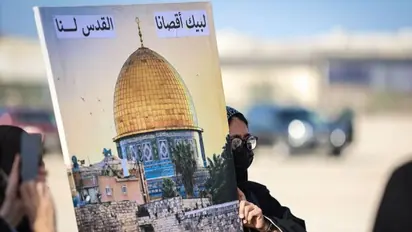Jerusalem's Al-Aqsa mosque in focus as Israel-Hamas tensions boil over

Synopsis
The Al-Aqsa mosque serves as a testament to the long and complicated history of the region, and highlights the ongoing political conflict surrounding the city of Jerusalem, says Girish Linganna
Israeli police raids on Jerusalem's Al-Aqsa mosque have once again brought one of the holiest religious sites of Muslims under the spotlight. The alleged police attacks on Palestinian worshippers inside the Al-Aqsa mosque -- the third holiest Muslim site after Mecca and Medina -- led to a barrage of rockets being fired by Palestinian group Hamas in Lebanon.
Things escalated from there with Israel retaliating by carrying out air raids in southern Lebanon, targeting what it said were Hamas positions. Separately, it also launched overnight air strikes on the besieged Gaza Strip, run by Hamas.
AL-AQSA MOSQUE
The Al-Aqsa mosque is considered one of the holiest places of Muslims because it is located on the Noble Sanctuary (Haram al-Sharif), often referred to as the 'Temple Mount' by the Western world.
The Noble Sanctuary is believed to be the site where the Prophet Muhammad ascended to heaven on his miraculous Night Journey (Isra and Mi’raj), making it a sacred site for Muslims. According to Islamic tradition, the Al-Aqsa mosque was the first house of worship on Earth, built by the Prophet Adam. It was later reconstructed by the Prophet Ibrahim and then rebuilt by the Prophet Sulaiman before being destroyed and rebuilt several times by different rulers and dynasties.
In addition to its religious significance, the Al-Aqsa mosque holds political and historical importance for Palestinians. The mosque is located in East Jerusalem, which the international community recognizes as part of the occupied Palestinian territories. Therefore, the mosque has become a symbol of Palestinian identity and a site of resistance against Israeli occupation.
The mosque is also important for Muslims because it is a place of unity, where Muslims from all over the world come together to pray and worship. It is a symbol of the strength and resilience of the Muslim faith, and it represents a shared history and heritage for Muslims worldwide.
POLITICAL RELEVANCE OF THE MOSQUE
The Al-Aqsa mosque is considered one of the oldest mosques in the world, with a history dating back to the 7th Century. The mosque has been the centrepiece of numerous historical and religious events and remains a highly symbolic site for the Islamic world.
The mosque has gone through several phases of construction and renovation, reflecting the changing political and religious climates of the region.
The current structure dates back to the 11th Century, built by the Fatimid dynasty. The mosque is notable for its distinctive silver dome, which was added in the 19th Century. The dome is visible from far distances and has become an iconic symbol of the mosque and the city of Jerusalem.
In addition to its significance as a religious landmark, the mosque has also played an important role in political events. During the Arab-Israeli conflict, the mosque was the site of a violent confrontation between the Israeli security forces and Palestinian worshipers in 2000, which escalated into an armed conflict.
The Israeli government has exerted strict control over the mosque and the site on which it stands since it occupied the city of Jerusalem in the 1967 War. As part of this control, the Israeli authorities have controlled access to the mosque, limiting the time and number of Muslim worshippers allowed to enter.
In 2017, the Israeli government installed metal detectors at the entrance to the mosque, sparking huge protests from Palestinians who criticized the move as an Israeli attempt to assert its control over the site.
Despite these challenges, the Al-Aqsa mosque serves as a testament to the long and complicated history of the region and highlights the ongoing political conflict surrounding the city of Jerusalem.
TEMPLE MOUNT OPENED FOR JEWISH VISITORS
The Temple Mount was opened for Jewish visitors on Tuesday, April 11, 2023, from 7 am to 11.30 am, but will remain closed throughout the rest of the Ramadan period, reports say. Netanyahu told media persons that consultations were being held on a daily basis with the security authorities about Jewish visits to the Mount.
THE COMPLICATED STATUS OF JERUSALEM
The status of Jerusalem is a highly sensitive and complex issue, with historical and political implications. It is claimed as the capital city by both Israelis and Palestinians. There is no international consensus on the ownership of Jerusalem and its status remains a matter of dispute between the two sides.
In 1980, Israel declared Jerusalem its “eternal and undivided capital”, but this has not been recognized internationally. The UN considers East Jerusalem, including the Old City and its holy sites, to be part of the occupied Palestinian territories.
The issue remains contentious and unresolved, with ongoing efforts by international organizations and governments to negotiate a peaceful resolution that can satisfy both sides.
Also Read: What the leaked US documents tell us about Ukraine War
Check the Breaking News Today and Latest News from across India and around the world. Stay updated with the latest World News and global developments from politics to economy and current affairs. Get in-depth coverage of China News, Europe News, Pakistan News, and South Asia News, along with top headlines from the UK and US. Follow expert analysis, international trends, and breaking updates from around the globe. Download the Asianet News Official App from the Android Play Store and iPhone App Store for accurate and timely news updates anytime, anywhere.